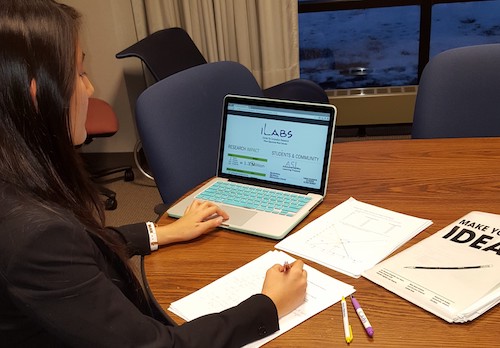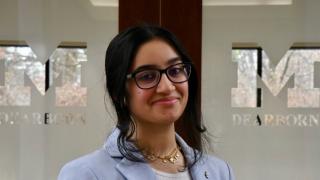Kristina Kelley wanted to meet people, add experience to her resume and understand how to conduct research. So when she first came to UM-Dearborn in 2019, the College of Business student applied to work at iLabs Center for Innovation Research.
“I didn’t know much about campus at that time and I was new to the Dearborn community. Becoming a student researcher has introduced me to great people and expanded my connections,” she says.
Through iLabs, Kelley says she’s worked with nonprofits, municipalities and businesses on projects that would help improve their processes and customer service. “I now know how to identify a problem and give solutions through collecting and analyzing data. That’s a valuable skill to have — at work, school or home.”
COB Assistant Dean for Student Engagement and Success Tim Davis and iLabs Project Manager Kari Kowalski say the iLabs research — which is a three-credit-hour independent study — is open to all students regardless of major or degree level.
Interested students can apply now for Winter 2021 client projects. After applying, students are interviewed and paired with projects that match with their interests. Each iLabs project team ranges from two to four people.
“No matter your academic interest, you can be successful in iLabs,” Kowalski says. “We don’t expect you to know everything — you are here to learn. What we are looking for is a can-do attitude and a willingness to learn; bring that and you will walk away with skills and experience that will benefit you.”
Marketing senior Brandon Harris says he connects with his iLabs mentors and student teammates remotely twice a week. During that time, he’s gained more than a resume line. He’s also grown his confidence.
“I’ve learned to clearly state my ideas and became more confident when expressing myself,” he says. “I’d never done research prior to this, but I knew it was key to presenting an informed solution to a business problem.”
Harris and Kelley have been working together on an iLabs project to examine if employer and student educational expectations match. They spoke with industry leaders in business and engineering, interviewed alumni and analyzed the data.
When the research duo found that the expectations didn’t match — Kelley says students think hard skills, like learning a specific program, is what employers want; employers say they can teach hard skills and would prefer developed soft skills like the ability to work well in a team — they created a presentation to virtually share with faculty. They will give the presentation later this month.
“We are going to present our findings and suggestions on how to bridge that gap,” says Kelley, who is a graduate student in finance. “The iLabs staff mentors you to make sure that you are ready to give your presentation — work with you from start to finish on a project to make sure it’s right and you are prepared for anything a client may ask.”
Davis, who’s led the center for more than a decade, says that’s the beauty of the iLabs experience: It prepares you for anything.
“It’s learning those soft skills employers are looking for and how to handle a multitude of professional situations,” Davis says. “We help students connect what they are learning in class to real world problems that need to be solved. The experience will help them in future — while also helping local businesses and agencies discover ways to improve their organizations.”
Check out the iLabs student researcher site for more information on the research experience.



